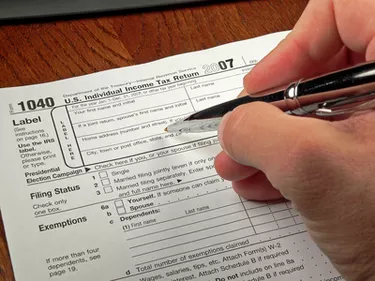
As a voter, you'll often be faced with voting for candidates who have different views on taxes. You'll also occasionally be asked to support or oppose certain local, county, state or federal tax hikes or cuts. Understanding how taxes affect you, your family, friends, businesses and places you live will help you decide if and when to support or oppose new taxes or increases or decreases to existing tax levels.
Video of the Day
Video of the Day
Benefits of Local Taxes
Municipalities (such as cities or towns) and counties can levy taxes for their own needs. These include taxes such as property, vehicle license, stamp, agricultural or amusement taxes. Local taxes are used to fund police and fire departments, hospitals, libraries, road improvements and other activities.
Cities that rely heavily on tourism often pass a room, restaurant or other sales tax to use to help promote tourism through marketing. These taxes also help to pay for the negative effects of tourism, such as extra policing and garbage cleanup, explains ResponsibleTravel.com. In the state of Georgia, counties can levy a Special-Purpose, Local-Option Sales Tax to fund specific improvements in roads, education, parks or other public facilities.
Read More: Who Must File Income Taxes?
Benefits of State Taxes
In the U.S., 42 states levy some type of personal income tax. Most of these states also charge businesses state income tax. These taxes are used similarly to local and county taxes – to fund public services. This is especially true of services such as roads and law enforcement.
States that have no income taxes raise money to pay for these services through higher use taxes. These are often called low-tax, low-service states because they don't/aren't able to provide the same level of services as states that charge an income tax.
The benefit for middle- and lower-income people living in a state with an income tax is that they pay less for groceries, food, property and other expenditures, explains Bankrate. They also benefit from more spending on things like schools, social welfare programs, roads and security. More of the burden of funding public services in these states falls on the wealthy and businesses.
Read More: What Happens if You Don't File Taxes?
Benefits of Federal Taxes
When you pay federal income tax, you not only pay for infrastructure improvements, but your taxes also help fund the federal government and agencies such as the Department of Agriculture, Federal Trade Commission, Federal Communications Commission, Departments of the Interior and Education, Fish and Wildlife Service, Social Security Administration, Federal Aviation Administration, Internal Revenue Service and Federal Emergency Management Agency.
Federal taxes also fund defense spending, international trade negotiation and enforcement, infrastructure spending and education.